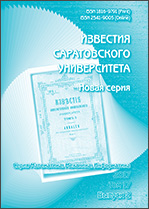|
Mathematics
Invariants on a set of reciprocal iterated exponential power coefficients
A. P. Bulanov
Obninsk Institute for Nuclear Power Engineering, 1, Studgorodok, 249020, Obninsk, Kaluzhskaya obl., Russia
Abstract:
A chain exponent $L_B(z)=z\cdot B(z)$, having a power sequence $\{b_n\}_{n=1}^{\infty}$, $b_n\ne0$, $n=1,2,\ldots$, $\overline{\lim\limits_{n\to\infty}}|b_n|<\infty$, is defined by a function sequence $B(z)=e^{b_1\cdot z\cdot B_1(z)}$, $B_1(z)=e^{b_2\cdot z\cdot B_2(z)}, \ldots, B_{k-1}(z)=e^{b_k\cdot z\cdot B_k(z)},\ldots$ (we use the denotation $B(z)=\langle e^z;b_1,b_2,\ldots\rangle$ in the paper). Similarly, a chain exponent $L_a(w)=w\cdot A(w)$ is defined where $A(w)=\langle e^w;a_1,a_2,\ldots\rangle$, having a power sequence of mutually inverse chain exponents up to the $4$-th order. In the paper, we find the concrete invariant of the $4$-t order expressed by the form of $3$-rd order with respect to powers. We give an example of two number sequences which are the powers of mutually inverse chain exponents adducing the truth of transformations performed.
Key words:
chain exponent, power, invariant, form, sequence.
Citation:
A. P. Bulanov, “Invariants on a set of reciprocal iterated exponential power coefficients”, Izv. Saratov Univ. Math. Mech. Inform., 15:4 (2015), 383–391
Linking options:
https://www.mathnet.ru/eng/isu606 https://www.mathnet.ru/eng/isu/v15/i4/p383
|

| Statistics & downloads: |
| Abstract page: | 184 | | Full-text PDF : | 87 | | References: | 47 | | First page: | 1 |
|




 Contact us:
Contact us: Terms of Use
Terms of Use
 Registration to the website
Registration to the website Logotypes
Logotypes








 Citation in format
Citation in format 